Man Gets Accused Of Driving A Wedge In The Family After He Refused To Let His Daughter Bring Her Dog Over For Christmas
Pet allergies are fairly common. Dog allergies typically result in more severe symptoms, despite the fact that allergies to cats are approximately twice as frequent.
This is particularly true for people who have asthma. A dog allergy can cause anything from mild to severe symptoms.
In individuals with limited sensitivity, symptoms might not appear for a few days after exposure. The only definitive cure for a pet allergy is to prevent the animal from entering your residence.
Meet u/slowpuncture, a Redditor who has a degree of allergy to dogs, not that he doesn't like them. When the OP goes to a house where there are dogs, he experiences tightness in his chest over a couple of hours, even without interacting with them directly.
The OP's daughter and partner have a dog that is good-natured but extremely lively. The OP is happy for the dog to visit them in the summer when they can all sit outside, and it can expend its energy in their large garden.
However, they want to bring it on Christmas morning, and the OP doesn't want it running around while they are opening presents and having a good time. He offered various options for the dog, but he knew they wouldn't be accepted.
Still, he stood firm about his decisions despite being told he was driving a wedge between the family. Read the OP's story below and decide if he's being unreasonable.
The Title

The OP recently redecorated our lounge at considerable expense with new flooring

There is no chance that it would just sit quietly

The Dynamics of Family Rules
Family rules and expectations can significantly influence interactions during gatherings. The father's decision to exclude his daughter's dog from Christmas illustrates how differing values can create conflict in family dynamics. Research in family psychology highlights that families often establish unwritten rules that govern behavior, which can lead to tension when these rules are challenged.
In this case, understanding the reasons behind the father's rules regarding pets can help foster better communication and understanding within the family. Open discussions about the significance of pets in family life can promote empathy and reduce conflict.
Navigating Family Dynamics and Pet Ownership
This scenario highlights the complexities of family dynamics when it comes to pet ownership. Research published in the Journal of Family Psychology indicates that disagreements over pets can often lead to larger conflicts within families. In this case, the father's refusal to allow his daughter's dog into the home points to underlying issues of control and family values.
Understanding these dynamics can help family members address their feelings and motivations regarding pet ownership and familial obligations.
They could leave the dog at home in the morning and pick it up before lunch
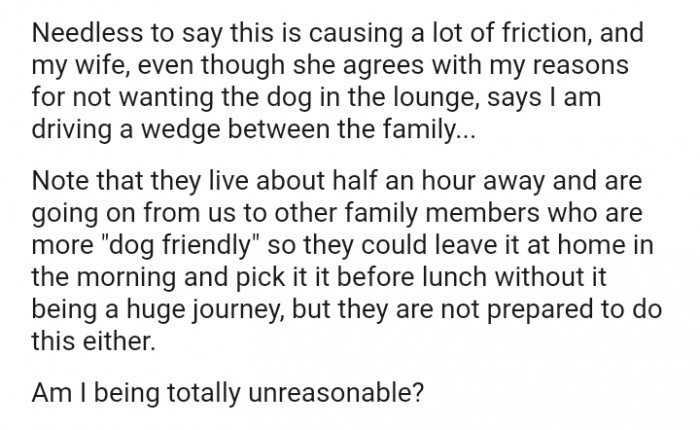
As usual, the comments rolled in, and here are some of the most upvoted ones

The other reasons are good points as well

Moreover, the emotional impact of excluding a beloved pet from family gatherings can lead to feelings of resentment and frustration. According to attachment theory, pets often serve as emotional support and companionship for their owners, which can complicate family relationships when pets are excluded. Research shows that acknowledging these emotional bonds can help families navigate these situations more effectively.
Encouraging discussions about the emotional significance of pets can foster understanding among family members and create a more inclusive environment during gatherings.
From a psychological perspective, the refusal to accommodate a pet can stem from various factors, including past experiences and personal beliefs. Studies show that individuals often hold strong emotional attachments to their spaces and may feel threatened by the presence of animals. In this situation, the father’s stance may reflect a desire for control over his environment, which can lead to tension in family relationships.
Encouraging open dialogue about the significance of the pet to the daughter can help bridge understanding and foster empathy within the family.
You don't need an excuse or reason

You have allergies, and it's your house

Your daughter seems to care more about the dog

The Importance of Compromise in Family Dynamics
Compromise is crucial for maintaining healthy family relationships, particularly during stressful times like the holidays. Research indicates that families who practice compromise experience greater relational satisfaction. In this scenario, exploring options for including the dog in family gatherings could help bridge the gap between differing opinions.
For example, creating a pet-friendly environment or establishing designated spaces for pets during family events could lead to a more harmonious gathering.
The Importance of Compromise in Family Relationships
Compromise is essential in family dynamics, especially when differing preferences regarding pets arise. A study from the Journal of Family Psychology emphasizes that families who engage in constructive communication and compromise tend to have more harmonious relationships. In this case, finding a middle ground that respects both the father's wishes and the daughter's attachment to her dog can lead to a healthier family dynamic.
Creating pet-free zones or establishing guidelines for the pet's behavior in the house can be effective solutions that honor everyone's feelings.
Everyone is entitled to enforce their own boundaries
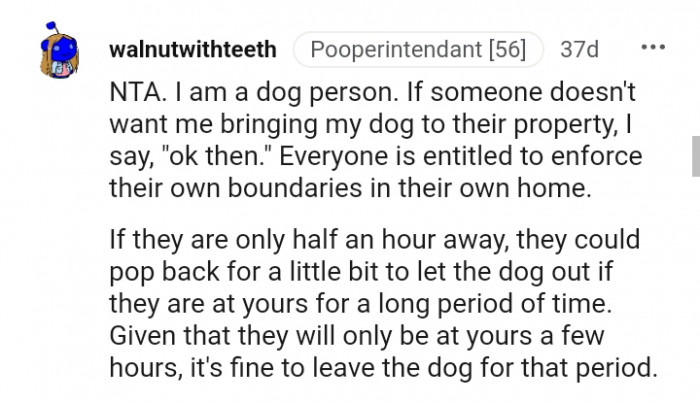
This isn't you driving a wedge in the family

You have offered solutions to the problem
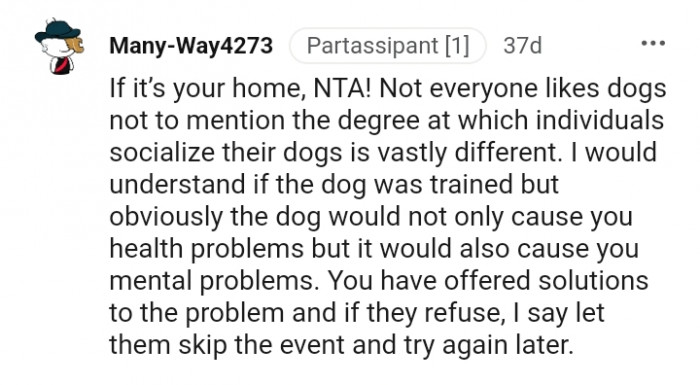
Furthermore, establishing clear boundaries regarding pets can enhance family dynamics. According to conflict resolution strategies, discussing and agreeing upon boundaries can lead to healthier interactions during family gatherings. This approach respects individual needs and promotes a sense of belonging among all family members.
Encouraging family discussions about the role of pets during gatherings can ultimately lead to healthier relationships and greater satisfaction for everyone involved.
People don't need to take their dogs everywhere

This Redditor loves dogs and is a dog owner
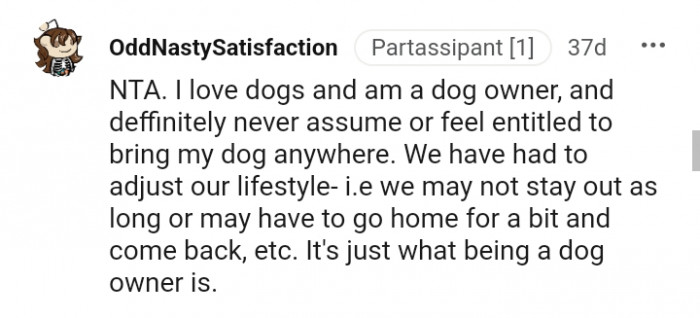
It is your house and your choice
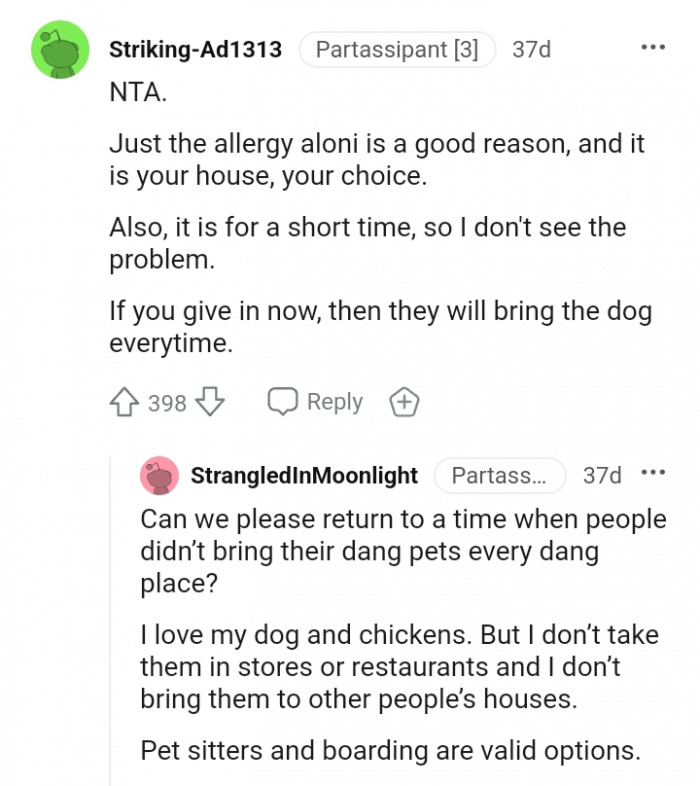
You want to be able to breathe in your home

The dog will be fine for a couple of hours
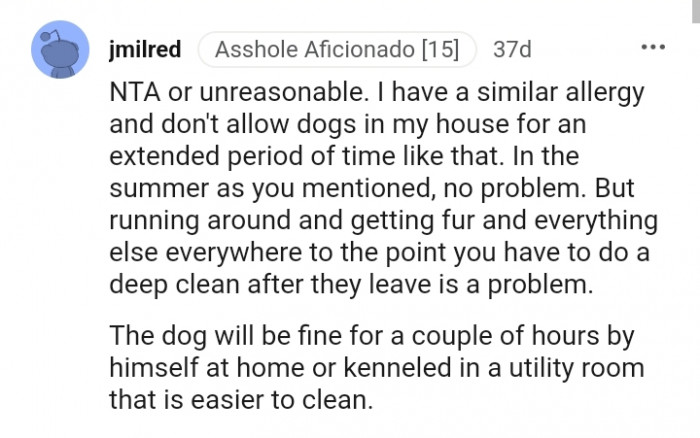
They are being as entitled as those with children
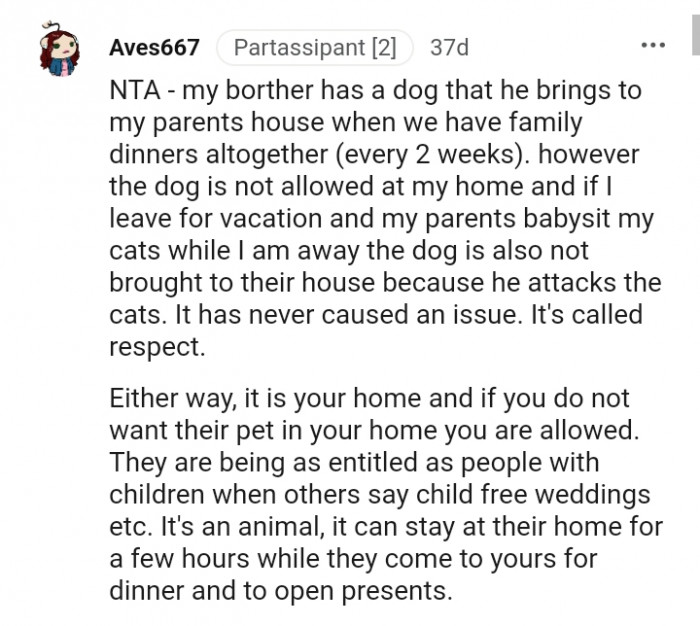
You have the right to literally breathe in your own house

Your daughter and partner need to realize this

You can make whatever rules you want

Things to think about before getting a dog

Icing on the cake

You really don't have to provide a list of reasons

The best way to handle a dog allergy is to avoid it. If you own a dog but are allergic to dogs, you might want to consider rehoming the dog.
The OP was only trying to avoid an episode because of his allergies, and Redditors understood that fact. What advice would you give the OP?
Drop it in the comments below and share this post as well.
Psychological Analysis
This situation illustrates the complexities of family relationships when pets are involved. It's essential for family members to communicate openly about their feelings and preferences regarding pets. Establishing compromises that respect everyone's emotional needs can help create a more harmonious family environment.
Analysis generated by AI
Analysis & Alternative Approaches
Family dynamics surrounding pet ownership can be challenging, but understanding the emotional implications can help resolve conflicts. Open communication and compromise are key to finding solutions that respect the needs of all family members.
Ultimately, creating a supportive environment that acknowledges both human and animal needs can foster healthier family relationships.
Analysis & Alternative Approaches
In conclusion, navigating family dynamics during the holiday season requires open communication and a willingness to compromise regarding pets. By discussing feelings and expectations surrounding pets, families can foster understanding and strengthen their bonds. Psychological research emphasizes the importance of healthy communication and conflict resolution in maintaining family harmony, especially during emotionally charged times.



